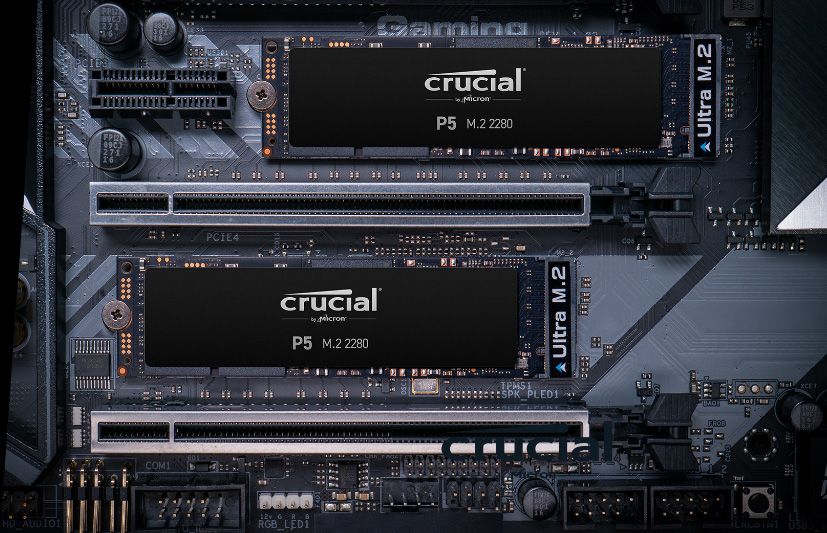Crucial's new P5 SSDs for 'serious gamers' are now shipping at up to 2TB
Specifications look good if you're willing to pay a premium for a fast SSD.

It took a few weeks since they were first announced, but Crucial's performance-oriented P5 SSDs are now available to buy in the US and UK. These are relatively high-speed SSDs (in the realm of PCIe 3.0), with prices to match.
Crucial introduced the P5 series in late April, billing them as being built for "serious gamers and creative professionals" in need of "quick response times." They're built around 96-layer triple-level cell 3D NAND flash memory chips produced by Crucial's parent company, Micron, which are paired with a home-grown controller.
Buyers have a variety of capacities to choose from, including 250GB, 500GB, 1TB, and 2TB. All four drives boast rated sequential read speeds of up to 3,400MB/s, and all but the 250GB model feature rated sequential write speeds of up to 3,000MB/s (the 250GB model writes at up to 1,400MB/s).
That puts the P5 series on the upper echelon of PCIe 3.0 SSDs, though not quite at the front of the pack. Samsung's 970 Evo Plus, for example, offers reads and writes of up to 3,500MB/s and 3,300MB/s, respectively. And of course the crop of PCIe 4.0 models up the ante with reads and writes in the neighborhood of 5,000MB/s on supported platforms (AMD X570 and B550).
Here's how pricing shakes out in the US and UK:
- Crucial P5 2TB—$399.99 at Newegg / £392.39 at Crucial
- Crucial P5 1TB—$179.99 at Newegg / £175.19 at Crucial
- Crucial P5 500GB—$90.99 at Newegg / £83.99 at Crucial
- Crucial P5 250GB—$62.99 at Newegg / £61.19 at Crucial

Best CPU for gaming: the top chips from Intel and AMD
Best graphics card: your perfect pixel-pusher awaits
Best SSD for gaming: get into the game ahead of the rest
These are fast drives (PCWorld has some benchmark data), hence why they command higher prices than more value-driven options on the market, like Intel's 660p or even Crucial's own P1 and P2 lines. That said, pricing is roughly in line with Samsung's 970 Evo line, except for the 2TB model—that one sells for $349.99 on Newegg.
For gaming, there's little difference between an ultra-fast SSD and a slower spec'd model. Even a 2.5-inch SSD that serves up speeds in the range of 550-580MB/s is good enough for gaming, at least for now. Whether that changes when developers get used to optimizing games for next-gen consoles with SSDs inside (Xbox Series X and PlayStation 5) remains to be seen.
The biggest gaming news, reviews and hardware deals
Keep up to date with the most important stories and the best deals, as picked by the PC Gamer team.
Where these faster speeds come into play on PCs is in other chores, like moving big files around, or lots of files that collectively add up. And compared to 2.5-inch SSDs, M.2 form factor drives (which can either be SATA or NVMe) are sleeker and do not require any cabling, which is nice.
Thanks, OC3D
Paul has been playing PC games and raking his knuckles on computer hardware since the Commodore 64. He does not have any tattoos, but thinks it would be cool to get one that reads LOAD"*",8,1. In his off time, he rides motorcycles and wrestles alligators (only one of those is true).


